What is the relationship between yoga and depression? How can yoga benefit people who suffer from depression?
Depression is the most burdensome illness in the world! According to the World Health Organisation, the prevalence of depression is rising by leaps and bounds. Currently, there are more than 350 million people across the globe suffering from some form of depression. In the United States alone 16 million people had a depressive episode in 2016.
What is depression?
Depression is a mood disorder that affects an individual at the emotional, cognitive, and somatic levels. It is characterized by –
- Depressed or sad mood
- Easily annoyed or short-tempered.
- Loss of interest or enjoyment in hobbies or activities that was previously enjoyed
- Feeling guilty or worthless
- Thoughts of death or suicide
- Poor concentration
- Difficulty making decisions
- Feeling restless or slow
- Feeling tired or fatigue
- Overeating or loss of appetite
- Weight loss or weight gain
- Changes in sleep pattern
According to the Diagnostic and Statistical Manual of Mental Disorder, Fifth Edition, depression is having 5 or more of the above symptoms for 2 or more weeks, which is causing tremendous emotional distress or hampering your day-to-day functioning.
Related: The #1 Cause of Chronic Depression and How You Can Turn It Off
The exact cause of depression is hard to say because multiple factors play a role. As per the National Institute of Mental, Health depression is a combination of genetic, environmental, biological, and psychological factors. So, the intensity and severity of depression vary from person to person. Also, the effect of depression on personal, professional, and social life may vary.
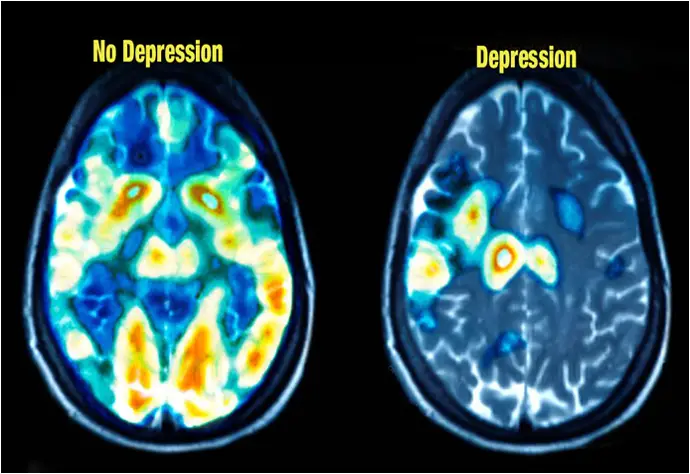
Impact of depression on mind
The three parts of the brain that play a key role in major depressive disorder are –
- Hippocampus (located in the center of the brain)
- Amygdala (located close to hippocampus)
- Prefrontal cortex (located in the front of the brain)
Hippocampus functions to store memories and regulate the production of cortisol, which is known as the stress hormone. During physical and mental stress and depression, our body releases excess amounts of cortisol.
Such chemical imbalance in the body and untreated stress and depression results in sending excessive cortisol to the brain. Normally, cortisol levels are high in the morning and low at night. However, in people with depression, cortisol levels are always elevated. Depression along with long-term exposure of the brain to cortisol disturbs various neurotransmitters in our brain.
Related: How Stressed Are You? Take This Stress Quiz To Find Out
Neurotransmitters are responsible for effective communication between neurons (brain cells produced in the part of the hippocampus). As a result, the production of new neurons in the hippocampus slows down. Over time, the neurons tend to shrink, which manifests as memory problems.
An excess amount of cortisol also causes the shrinkage of the prefrontal cortex that regulates emotions, decision-making, and formation of memories. On the contrary, the amygdala becomes enlarged as a result of constant exposure to high levels of cortisol. It is the part of the brain that is associated with emotional responses like fear or pleasure. When enlarged and hyperactivated, the amygdala shows abnormal activity that results in disturbances in the sleep cycle and activity patterns.
High levels of cortisol cause the release of other hormones and chemicals like dopamine, serotonin, in our brain in irregular amounts leading to further complications.
Related: 6 Ways to Build a Strong Relationship When Struggling With Depression
Norepinephrine
It is an important hormone that helps our body fight against stress and any threatening situations. But, excess levels of stress generated by cortisol keep the norepinephrine at a high level and our body in the state of fight. As a result, our immune system becomes weak making us prone to anxiety, depression, and disorders like kidney damage, heart disease, etc.
Dopamine
Excess cortisol and chronic stress reduce dopamine levels. Dopamine is a vital chemical messenger responsible for transmitting signals between the nerve cells (neurons) of the brain. Low dopamine results in apathy, mood swings, fatigue, reduced sensation of rewards, and pleasure.
Related: The Effect of Stress on the Immune System (And How to Relax Naturally)
Serotonin
It is a chemical that boosts wellbeing and happiness. But, reduction in serotonin due to high stress and cortisol results in a bad mood, loss of appetite, fatigue, poor social behavior, and depression. Also, people with depression are found to have low serotonin levels, which is why this chemical plays a great role in the treatment of depression.
Depression also reduces certain GABA neurotransmitters with evidence pointing to an association between major depressive disorders and diverse types of GABAergic deficits.
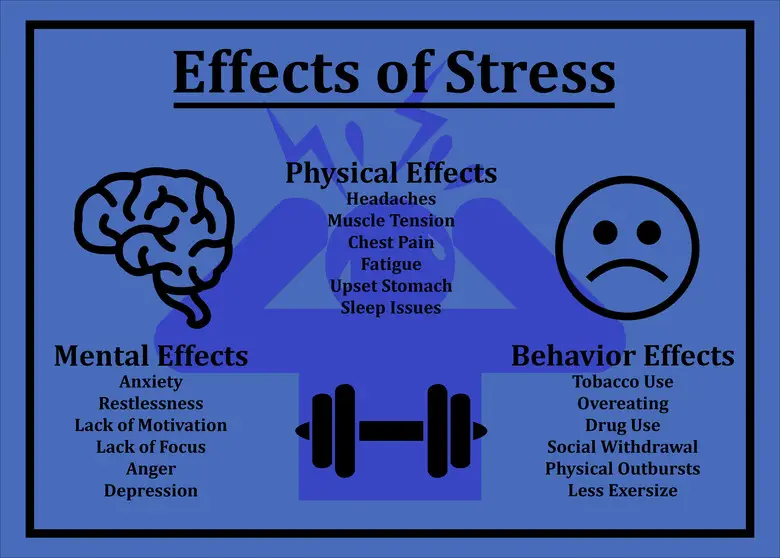
As you can see high cortisol and stress not only affects the mind to cause depression but affects the whole body.
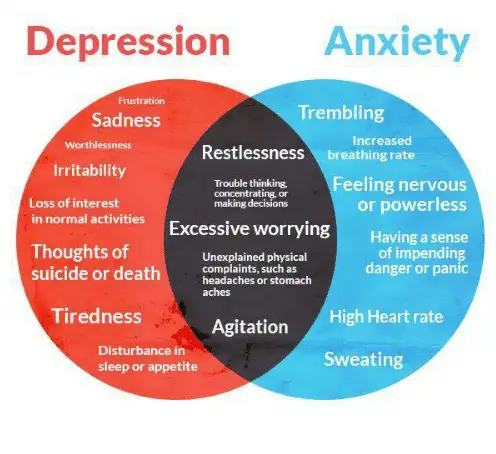
The Continuous cycle of stress and depression
Depression can be viewed as a vicious cycle. High stress stimulates cortisol, which leads to hormonal and chemical imbalances that affect appetite, sleep cycle, the sense of pleasure, decision-making, mood, interest in activities like exercise that can reduce depression. It means stress induces behaviors that cause depression and depression further fuels stress.
There is a need for effective intervention to manage depression because it doesn’t just affect the mind and brain but the whole body to some extent. This state of mind is more than just being sad or having low-self-esteem. If left untreated, depression can lead to suicide.
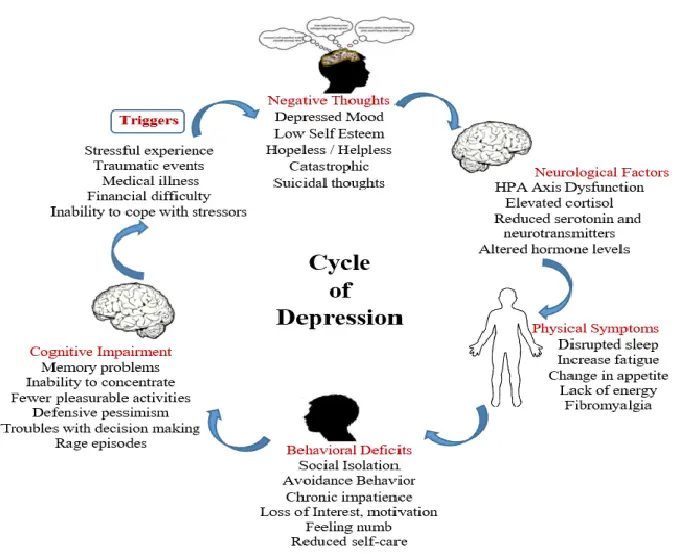
How can depression be managed?
Talking about treatment for depression there are various methods used like psychotherapy or medications (antidepressants) or a combination of both. However, these treatment methods only help in alleviating symptoms. But “depression cannot be cured”.
Related: 11 Holistic Hacks To Reduce Stress And Anxiety
There is intense research going on to find alternative treatment options for depression with the major focus on mind-body interventions such as yoga. The reason is a lot of people hesitate or refuse to participate in talk therapy or avoid medications. Primary treatments like anti-depressants do not benefit all patients. Around 10 to 30% of patients with depression fail to respond to antidepressants (treatment-resistant depression) or experience only mild improvement.
Related: Music Therapy for depression – how can it heal you?
Other reasons could be due to unresolved issues of the patient, side effects of medications, lack of resources to access mental health care services, unmet needs, and personal choice.
It is very hard to explain to people who have never known serious depression or anxiety the sheer continuous intensity of it. There is no off switch.
– Matt Haig, bestselling author.
Depression can be temporary or permanent and can cause partial or total disability. Considering the rising number of depression cases all over the world, there is a need for complementary therapies. An increasing number of researchers claim that yoga has the potential to be used as an alternative and complementary treatment for depression.
Dr. Mason Turner of the Kaiser Permanente Medical Group says yoga therapy “can be very powerful in the treatment of depression.”
What is Yoga?
Originated in ancient India around 3000 BCE, yoga is a group of physical, mental, and spiritual practices or disciplines. In Indian tradition, it is more than physical exercise. Because it involves both mental and spiritual states. The term yoga comes from the Sanskrit word “Yuj” which means yoke or union. In short, yoga is the harmony between body, mind, and spirit. This is how yoga is linked to reducing the symptoms of depression.
Ever since yoga was introduced to the west, it has developed into a posture-based physical fitness, stress-relief, and relaxation technique consisting largely of physical postures or asanas.
Related: 6 Yoga Mudras To Heal Common Ailments
A vast literature available on the health benefits of yoga reveals that it –
- Improves flexibility
- Generate balanced energy
- Reduce breathing and heart rate
- Increases blood flow
- Reduce aches and pains
- Lowers blood pressure
- Lowers the level of stress hormones like cortisol
- Reduce stress and anxiety
- Calms the mind
Yoga practices have been used for improving various ailments such as arthritis, cancer, and a range of mental health symptoms. Yoga is helpful because of gentle, calming, and fluid nature.
Styles of Yoga
Hatha
This style of yoga includes gentler and slower-paced movements including asanas (yoga postures) and pranayama (breathing exercises) so it is beneficial for beginners. Hatha prepares the body for deeper spiritual practices such as meditation.
Ashtanga
Based on ancient yoga teachings, this style comprises of quick and specific sequenced poses performed in the same order and is more physically demanding.
Related: Opening Your True Self with Yoga. How to Find a Right Style of Yoga for You?
Vinyasa
In this yoga style, one focuses on both movements and breathing, starting slowly and gradually increasing the pace. It incorporates many of the same postures, but the order or variance of the poses often changes.
Iyengar
This yoga style focuses on the structural alignment of the physical body through the practice of asanas and use of props, such as blocks, chairs, and straps to help you find proper body alignment.
Bikram
In this style of yoga, a fixed sequence of 26 postures and 2 breathing exercises (performed in the same order) is practiced in a room heated to 105 °F (41 °C) with a humidity of 40%.
Related: Yoga Poses To Release Emotional Pain
Hot
Hot yoga is done in a heated room without any set or sequence of poses.
Kundalini
This style of yoga incorporates movement, dynamic breathing techniques, meditation, and the chanting of mantras, for a more physically demanding exercise.
Restorative
It is a passive-style yoga that allows you to relax and release the body into a gentle stretch that is held for as long as 10 minutes.
Yin
This yoga style stretches and targets both the deep connective tissues between the muscles and the fascia throughout the body to increase circulation in the joints and improve flexibility. It mainly involves seated and back poses.
Research evidence on the effectiveness of yoga in reducing depression
As per the Harvard Mental Health Letter, recent studies suggest that yoga therapy can reduce the impact of stress, reduce anxiety, and depression. Just like meditation, yoga is a self-soothing technique and improves energy.
While depression damages concentration and mood and drains motivation, yoga offers a form of exercise to people with depression. Moreover, yoga is gentle and very relaxing. Also, it can be performed in an enjoyable way to begin an exercise regime. One need not have high skills to practice yoga, anyone can start with it and yoga sessions are designed to offer a supportive sense of community. Such support is important because depressed people have low self-esteem and feel worthless which prevents them from participating in physical activities.
Related: The Science behind Yoga and Stress
A large body of research suggests that yoga can reduce the levels of cortisol the stress hormone in our body. This is because breathing exercises induce the body’s relaxation response. And when practiced together with mindfulness meditation (another part of yoga) the study subjects showed a decrease in cortisol levels. Other studies demonstrated that yoga also reduces the size of the amygdala which is enlarged due to excess cortisol during stress and depression.
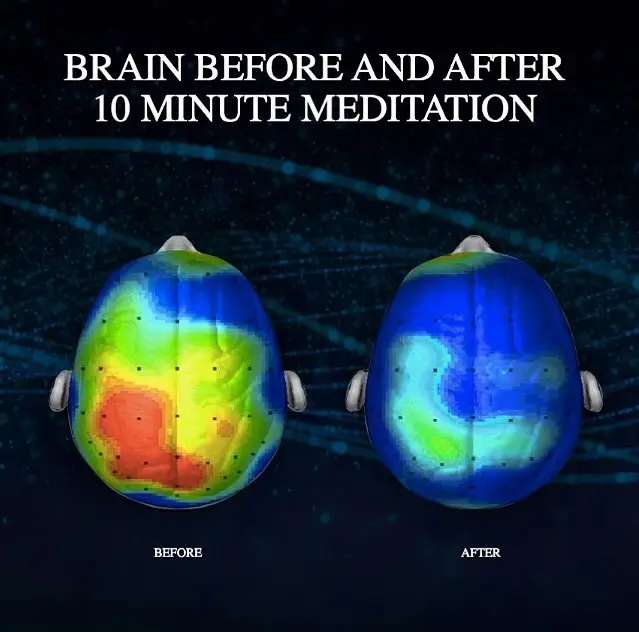
Harvard Medical School’s website mentioned an interesting study conducted at the University of Utah, investigated the effect of yoga on the stress response. The researchers observed the participants’ responses to pain when subjected to more or less painful thumbnail pressure. 12 of these participants were yoga practitioners, 14 of them were diagnosed with fibromyalgia or stress-related illness and 16 were healthy volunteers.
Based on functional MRI results it was concluded that yoga practitioners had the highest pain tolerance and lowest pain-related brain activity, whereas those having fibromyalgia perceived pain at lower pressure levels compared to the remaining two groups. Also, people with high stress had the greatest activity in areas of the brain associated with the pain response. The study emphasizes on effectiveness of yoga, which can help a person regulate their stress and, therefore, pain responses.
In a 2017 systematic review (including randomized control trials, quasi-experimental, and pretest/posttest) titled, “The Efficacy of Yoga as a Form of Treatment for Depression”, 23 yoga interventions (published between 2011 and May 2016) were evaluated, where the majority were 6 weeks or longer. The review concluded that yoga is effective in reducing depression.
Related: Which Kind Of Yoga Should You Practice Based On Your Lifestyle?
Two randomized control trials tested the efficacy of a 12-week yoga intervention in people with major depressive disorder. Results showed an increase in brain GABA associated with specific yoga postures and breathing practices in depressed patients when compared to healthy control participants. Also, there was an improvement in mood and anxiety measures with scores equivalent to those of non-depressed individuals. The first time that yoga postures have been associated with a positive correlation between acute increases in thalamic GABA levels.
Another study showed a reduction in suicide ideation (without intent) for people with depression after Iyengar yoga intervention.
Lindsey Hopkins conducted a study involving 23 male veterans to study the effectiveness of hatha yoga focusing on physical exercises, meditation, and breathing exercises for 8 weeks (and twice a week). People with high scores on the depression scale before intervention demonstrated low scores after intervention. Besides, participants enjoyed the sessions and rated it 9.4 on a scale of 10.
A similar study (involving 52 women aged 25-45 years separated into randomized and control groups) on the effectiveness of Bikram yoga against depression showed a significant reduction in symptoms of depression after 8 weeks.
It can be concluded that the existing literature well-established the efficacy of yoga in decreasing the symptoms of stress and depression. Also, these studies support the need for more investigation in this field with larger samples and effective study designs to prove the effectiveness of yoga on mood disturbances.
Yoga and depression: How does it work?
1. Yoga calms mind
Practicing yoga through asanas, breathing techniques, chanting mantras (sounds and words) enables one to take a deep dive into your inner world. You can know yourself better and gain high self-awareness. We can easily connect to our thoughts, ideas, and behaviors and harmonize our states of mind, memory, and body. As a result, we feel calmer and more peaceful.
2. Yoga reduces stress
While cortisol causes the shrinkage of neurons, deep breathing and meditation reduce stress and produce proteins for repairing neurons and increasing neuroplasticity (the brain’s ability to reorganize itself by forming new neural connections throughout life).
Related: Meditation and Yoga Can Reverse DNA Reactions Which Cause Stress
3. Yoga fights anxiety
Practicing asanas, deep breathing, and concentrating on different parts of the body contributes to mental and emotional peace. You can turn negative thoughts into positive ones, which helps you control anger, irritability, fear, apathy, and complex emotions. It enables us to lower stress and anxiety, relieve inflammation, and strengthen the immune system.
Related: 20+ Best Meditation Music For Relief From Stress and Anxiety
4. Yoga boosts mood
Practicing yoga directly affects mood and emotions, which are the main symptoms of depression. It reduces the intensity of emotional symptoms and provides a state of relaxation and tranquility. The state of relaxation helps us sleep better and more deeply.
Related: 36 Most Relaxing Songs For Anxiety, Stress And Depression
5. Yoga improves hormonal balance
Regular yoga can improve the blood flow to the brain regulate happy hormones like dopamine, endorphin and naturally boost serotonin in our bodily system. Yoga can restore the hormonal and chemical imbalances caused by cortisol and improve our mood.
6. Yoga strengthens musculoskeletal system
The different asanas increase the flexibility of our muscles and strengthen ligaments, tendons, and fascias, which make us stronger. These asanas stimulate different parts of the body and induce a pleasurable sense of well-being.
Related: Benefits of Yoga for Men That Will Change Your Life
7. Yoga improves heart rate
By increasing the relaxation response over the stress response, yoga improves the heart rate variability (HRV), which is the change in the time between heartbeats. A person with high HRV can well adapt to stress and is better at self-monitoring.
Takeaway
There is growing evidence indicating that yoga is a holistic practice for fighting depression and other disorders. Although yoga cannot replace pharmacological or psychological treatment, it is a safe, cost-effective, and appealing approach to better manage the symptoms of depression and overall health.
Thus, yoga and depression are related. Also, the scientific study of yoga proves that mental and physical health are not just closely allied, but are essentially equivalent. There are different yoga asanas and some are highly strenuous and may not be appropriate for all age groups. It is suggested to practice yoga under expert guidance and those with mobility problems or elderly patients must consult health care experts to choose yoga as a treatment option.
References
- Edition, F., 2013. Diagnostic and statistical manual of mental disorders. Am Psychiatric Assoc.
- Cacha, L.A., Poznanski, R.R., Ariff, T.M. and Latif, A.Z., 2019. Psychophysiology of Chronic Stress: An example of Mind-body Interaction. NeuroQuantology, 17(7).
- Singh, I., 2019. Exploring the therapeutic effects of yoga and its ability to increase the quality of life.
- Al-Harbi, K.S., 2012. Treatment-resistant depression: therapeutic trends, challenges, and future directions. Patient preference and adherence, 6, p.369.
- Young, S.N., 2007. How to increase serotonin in the human brain without drugs. Journal of psychiatry & neuroscience: JPN, 32(6), p.394.
- McEwen, B.S., 2003. Mood disorders and allostatic load. Biological psychiatry, 54(3), pp.200-207.
- Thirthalli, J., Naveen, G.H., Rao, M.G., Varambally, S., Christopher, R. and Gangadhar, B.N., 2013. Cortisol and antidepressant effects of yoga. Indian journal of psychiatry, 55(Suppl 3), p.S405.
- https://www.sciencedaily.com/releases/2013/03/130328142313.htm
- Hölzel, B.K., Carmody, J., Vangel, M., Congleton, C., Yerramsetti, S.M., Gard, T. and Lazar, S.W., 2011. Mindfulness practice leads to increases in regional brain gray matter density. Psychiatry research: neuroimaging, 191(1), pp.36-43.
- Luscher, B., Shen, Q. and Sahir, N., 2011. The GABAergic deficit hypothesis of major depressive disorder. Molecular psychiatry, 16(4), pp.383-406.
- Streeter, C.C., Whitfield, T.H., Owen, L., Rein, T., Karri, S.K., Yakhkind, A., Perlmutter, R., Prescot, A., Renshaw, P.F., Ciraulo, D.A. and Jensen, J.E., 2010. Effects of yoga versus walking on mood, anxiety, and brain GABA levels: a randomized controlled MRS study. The Journal of Alternative and Complementary Medicine, 16(11), pp.1145-1152.
- Nyer, M., Gerbarg, P.L., Silveri, M.M., Johnston, J., Scott, T.M., Nauphal, M., Owen, L., Nielsen, G.H., Mischoulon, D., Brown, R.P. and Fava, M., 2018. A randomized controlled dosing study of Iyengar yoga and coherent breathing for the treatment of major depressive disorder: Impact on suicidal ideation and safety findings. Complementary therapies in medicine, 37, pp.136-142.
- McCrary, M., 2013. Pick your yoga practice: Exploring and understanding different styles of yoga. New World Library.

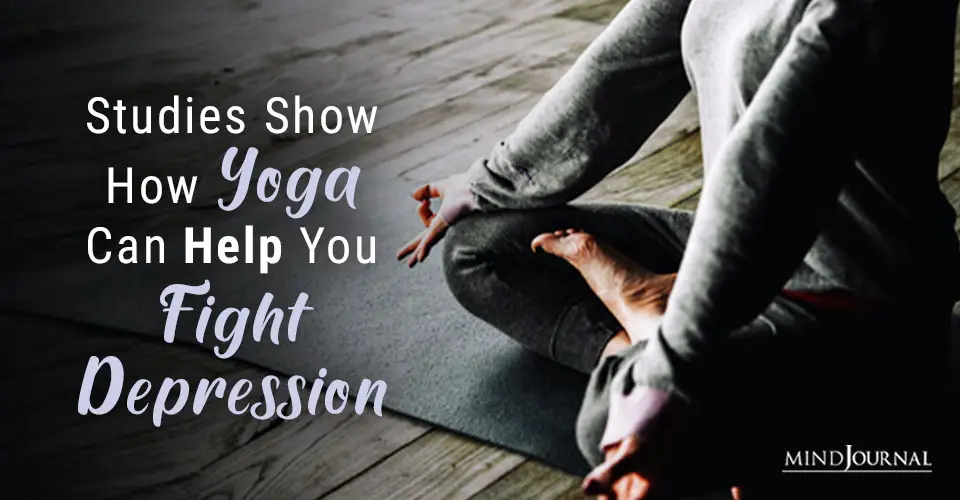





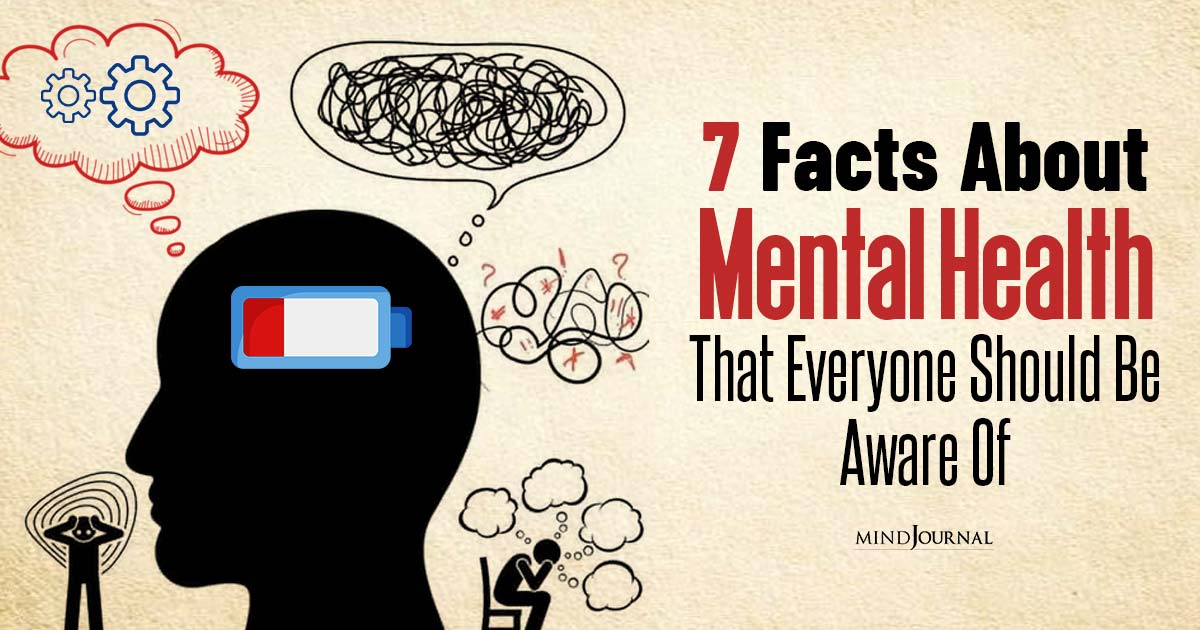

Leave a Reply
You must be logged in to post a comment.